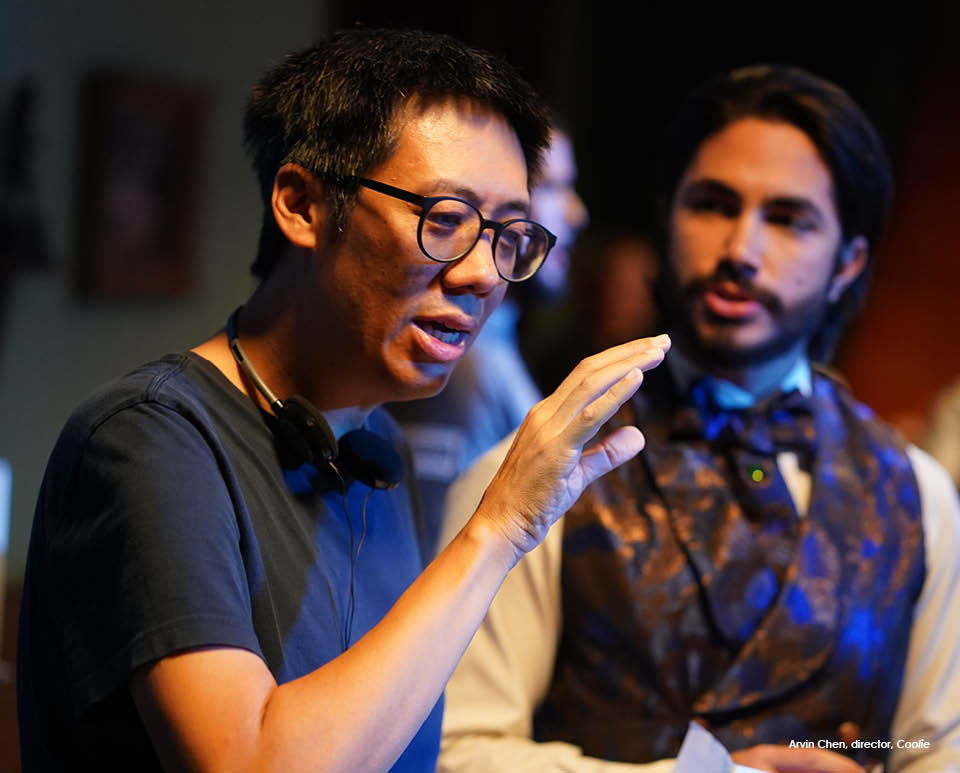
Taiwanese-American director, Arvin Chen, isn’t thinking of his recent shift from film to TV as anything like a giant leap.
Known as one of contemporary Asian cinema’s strongest voices, Chen says his TV projects – Pachinko and Coolie – are more of a seamless journey from film into a much bigger cinematic world.
About six weeks into the Coolie shoot, Chen says he doesn’t think of Coolie (or Pachinko) as traditional TV.
“I just think, ‘wow, I get to work on like a project of this scale’,” he says.
Chen also talks about the dissolution of film – "the idea of film being shot on celluloid is now nostalgia," he says – and the evolution of television into long-form storytelling that goes way beyond the episodic format.
"I don’t I don’t view film as film and TV as TV anymore. I just feel like okay, it’s just different formats for storytelling... television has become so cinematic," he says.
He brings that outlook to Coolie, trying to make each scene as cinematic as possible.
"The way it's written, the way it's structured, the way we light and shoot it... it doesn't feel like we're going, 'oh, this is episode one, episode two, episode three...' We're shooting it like a long-form movie that we are going to divide into episodes."
Like Pachinko, Coolie is a sweeping period piece, with a multi-cultural international cast.
The first project from film-industry veteran Meileen Choo’s three-year-old Singapore-based Cathay Film Company, Coolie is about an illiterate young Chinese village girl who sets off from southern China to marry a rebel son working on a sugarcane plantation in Cuba.
The eight-episode premium drama, set in the 1860s, started shooting in the Dominican Republic and Panama in December 2023.
Chen is directing five of the eight episodes, with the other three directed by Julian Acosta.
Hong Kong actress/model Louise Wong (Anita) stars alongside Taiwan’s Joseph Chang (Eternal Summer), Colombia’s Mauricio Henao (Fake Profile), and Cuba’s Camila Arteche (Sergio & Serguei).
Coolie continues Chen’s growing fascination with the intertwining of cultures.
“When I was more a writer-director, I was very interested in romance and romantic comedies and that world... In the last few years...
Taiwanese-American director, Arvin Chen, isn’t thinking of his recent shift from film to TV as anything like a giant leap.
Known as one of contemporary Asian cinema’s strongest voices, Chen says his TV projects – Pachinko and Coolie – are more of a seamless journey from film into a much bigger cinematic world.
About six weeks into the Coolie shoot, Chen says he doesn’t think of Coolie (or Pachinko) as traditional TV.
“I just think, ‘wow, I get to work on like a project of this scale’,” he says.
Chen also talks about the dissolution of film – "the idea of film being shot on celluloid is now nostalgia," he says – and the evolution of television into long-form storytelling that goes way beyond the episodic format.
"I don’t I don’t view film as film and TV as TV anymore. I just feel like okay, it’s just different formats for storytelling... television has become so cinematic," he says.
He brings that outlook to Coolie, trying to make each scene as cinematic as possible.
"The way it's written, the way it's structured, the way we light and shoot it... it doesn't feel like we're going, 'oh, this is episode one, episode two, episode three...' We're shooting it like a long-form movie that we are going to divide into episodes."
Like Pachinko, Coolie is a sweeping period piece, with a multi-cultural international cast.
The first project from film-industry veteran Meileen Choo’s three-year-old Singapore-based Cathay Film Company, Coolie is about an illiterate young Chinese village girl who sets off from southern China to marry a rebel son working on a sugarcane plantation in Cuba.
The eight-episode premium drama, set in the 1860s, started shooting in the Dominican Republic and Panama in December 2023.
Chen is directing five of the eight episodes, with the other three directed by Julian Acosta.
Hong Kong actress/model Louise Wong (Anita) stars alongside Taiwan’s Joseph Chang (Eternal Summer), Colombia’s Mauricio Henao (Fake Profile), and Cuba’s Camila Arteche (Sergio & Serguei).
Coolie continues Chen’s growing fascination with the intertwining of cultures.
“When I was more a writer-director, I was very interested in romance and romantic comedies and that world... In the last few years, I’ve become more interested in telling multi-cultural stories.
“As I work more as a director and less as a writer-director, I kind of want to tell multi-cultural stories... it seems organic to who I am, organic to how I’ve been working. It’s more than just the subject itself. That type of story just seems to be more interesting to me.”
At the same time, Chen may not have accepted the Coolie project were it not for show runner Meileen Choo, who supported his first film, and executive producer In-Ah Lee (Land of Plenty).
"I wasn't looking to take on such a big project after Pachinko...," he says.
"But it didn't feel like just a job. Meileen and In-Ah are friends and collaborators who I've worked with before... I knew it would be a good project because they're involved, so that help assuage any other considerations I had about the time commitment, or the ambition of the project," he says.
"But again, the ambition of the project is one of the reasons I like it."
The Coolie shoot will last for about four months. In all, with post-production, Chen is looking at a commitment of up to a year.
Filming in the Dominican Republic and Panama is Chen's first immersion into the filmmaking environments of Central and South America.
His top-of-mind impressions are less about cast or craft, than about culture.
And perhaps a little cliche, he admits.
"I've just never been on a set where people are always dancing. Every time there's music, from the street or anywhere, everyone starts dancing. I'm used to East Asian crews, Taiwanese, Chinese, Korean... it's literally, every time there's music, you look around and everyone is dancing, in the camera department, everyone...to me, I don't want to sound cliched, but... it really gives a warmth to the set that I've never experienced before".
If he’s happy to swing between film and TV as a director, Chen has no plans to follow his movie screenplays like Au Revoir Taipei and Will You Still Love Me Tomorrow with writing TV scripts.
He says a 90-page film script takes him about a year to write. “I think of, oh my god, eight episodes or 10 episodes… I can do it as a director, but as a writer, that’s just too much story for me to deal with.”
“It’s really hard to write a feature film. I’m in awe of TV writers, people who are able to write that much and think at that scale,” he adds.
“That’s definitely, I think, beyond my capabilities as a writer to write that much content,” he says, adding: “I just don’t think I could do it”.























